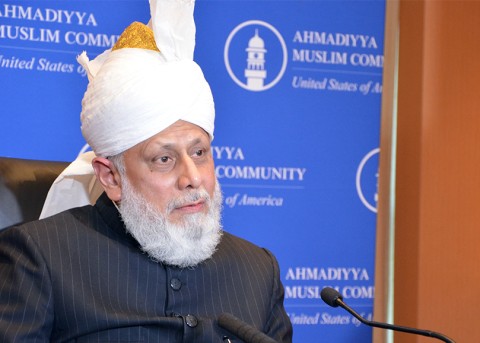Mirza Masroor Ahmad, leader of Muslim minority group, visits faithful in U.S.
Globally, the Ahmadiyya Muslim Community includes 10 to 20 million people with a message of “love for all, hatred for none.”

Mirza Masroor Ahmad, spiritual leader of the Ahmadiyya Muslim Community, toured the United States for three weeks October, visiting U.S. adherents belonging to the global body of 10 to 20 million.
Masroor Ahmad, called the khalifa or caliph, heads a small subset of Islam whose theology closely resembles that of most Sunni Muslims, save for an important distinction: Ahmadi Muslims believe that their founder, Mirza Ghulam Ahmad, who died in 1908, was the mahdi, a savior prophesied to usher in the end times and the peaceful triumph of Islam. Masroor Ahmad, the founder’s great-grandson, who lives in the United Kingdom, was elected in 2003 as the fifth caliph.
This belief has led to persecution from other Muslims in various parts of the world such as Pakistan, where Masroor Ahmad was raised. Masroor Ahmad emphasized that members of his community hold fast to a message of peace, echoing the slogan on many signs during his visit: “Love for all, hatred for none.”
As for their persecutors, “we can only try to make them understand,” he said during a news conference. “But the true teaching of Islam is love, peace and harmony.”
The group’s centralized hierarchy under the caliph has allowed it to broadcast—literally, as the sect operates its own television stations—a unified message of peace and interfaith dialogue worldwide.
While in Philadelphia and Baltimore, he inaugurated new mosques. He also visited Houston and was greeted by adoring crowds in each city. His tour included outreach to non-Muslims, including meeting with elected officials.
Masroor Ahmad stressed the need for interfaith cooperation, giving the example of standing with Jewish neighbors after anti-Semitic attacks. Their faith teaches the Ahmadi to “stand shoulder to shoulder” with others, Masroor Ahmad said.
Basir Jamil, 25, who volunteered to provide security and other assistance in Baltimore, said that the caliph’s illustrious role didn’t distract from Ahmadis’ personal connection to the divine.
“Even though he’s a spiritual leader, he’s ultimately still a man,” Jamil said. “Sometimes we have to remind ourselves that what matters is God—he’s just there to guide us.” — Religion News Service
A version of this article appears in the print edition under the title “People: Mirza Masroor Ahmad.”





